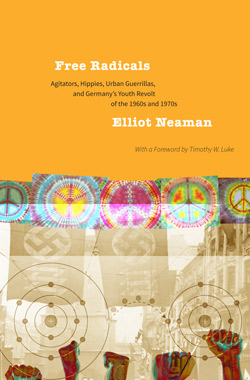“Incidentally, I notice that our professors, trying to show off to their students, rant and rail against the state and against law and order, while expecting that same state to punctually pay their salaries, pensions, and family allowances, so that they value at least this kind of law and order. Make a fist with the left hand and open the right hand receptively—that is how one gets through life.”
—Ernst Jünger, Eumeswil
|
Elliot Neaman’s Free Radicals: Agitators, Hippies, Urban Guerrillas and Germany’s Youth Revolt of the 1960s and 1970s is now available for purchase in our online store. Save 20% on the list price by using the coupon code BOOKS20 during the checkout process. Also available in ebook format at Amazon.com (Kindle) and Barnes & Noble (NOOK). Free Radicals
Elliot Neaman’s Free Radicals presents a comprehensive panorama of the West German youth revolt in the 1960s, as well as its subsequent fragmentation and descent into terrorism in the 1970s. Neaman argues that the activists of the 1960s fundamentally misconstrued the nature of the young German republic, conflating it with earlier problematic German polities, and offered hazy world-shattering utopias to replace it based on artificial historical comparisons. The student radicals at first were swept along by liberalizing forces, but then made a decisive turn against reform in favor of an aggressive rejection of the existing order. In “The Crisis of Capitalist Democracy,” from Telos 152 (Fall 2010), Adrian Pabst “charts the rise of capitalist democracy” in its conceptual and historical origin, and then in its empirical and contemporary manifestation, before presenting an alternative. This alternative seeks the re-emergence of an autonomous realm of “civil society” that is not subsumed by either the free market or the liberal democratic state. Pabst begins by sketching the collusion of capitalism and democracy and their subsequent fusing into modern “market-states.” Representative democracy, in the same way that free-market capitalism creates abstract, virtual value from local and material processes, “tends toward the formalization and abstraction of politics from the people it purports to represent.” The collusion, therefore, of democratic states with free-market capitalism has led to a third-way combination of “some of the worst elements of the left and the right.” “It wasn’t death that frightened him—that was a certainty—but rather the element of chance, the tumbling movement through time and space, which could descend any second into annihilation—this feeling of having worth and yet not being more than an ant that could be squashed in the street by the heedless step of a giant. Why, if there were a Creator, had he given men the desire to penetrate into the essence of a world that he could never fully fathom? Wouldn’t it be better if men lived like animals or plants than always with this terrible anxiety lurking beneath the surface of everything that they said and did?” Debates about the status of academic freedom in Israel, Gaza, and the West Bank have for years focused almost exclusively on claims about the negative impact particular Israeli government and Israeli Defense Force (IDF) policies and practices have had on Palestinian students and faculty. Largely ignored, especially as the Boycott, Divestment, and Sanctions movement (BDS) levels accusations against Israel and promotes boycott and divestment resolutions directed against the Jewish state, has been the broader character of academic freedom on Palestinian campuses. Indeed there is little evidence that most students and faculty in the West know what the major threats to academic freedom in Gaza and the West Bank are, let alone who is responsible for carrying them out. “Some believe themselves to be experiencing the end of the world. In reality we are only experiencing the end of the relation between land and sea, which had held up to this point. Still, human angst [Angst] in the face of the new is often as great as the angst in the face of the void, even when the new is the overcoming of the void. Thus, the many see only senseless disorder, where, in reality, a new sense struggles for its order. Admittedly, the old nomos falls away and with it a whole system of received measures, norms, and relations. But that which is coming is not therefore only measurelessness or a nothingness hostile to nomos. Even in the embittered struggle of old and new forces, just measures emerge and sensible proportions are constructed.” —Carl Schmitt, Land and Sea: A World-Historical Meditation |
||||
|
Telos Press Publishing · PO Box 811 · Candor, NY 13743 · Phone: 212-228-6479 Privacy Policy · Data Protection Copyright © 2024 Telos Press Publishing · All Rights Reserved |
||||



